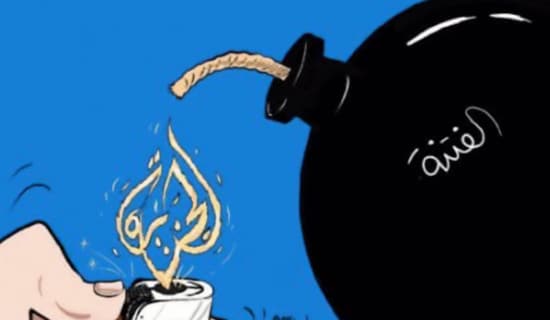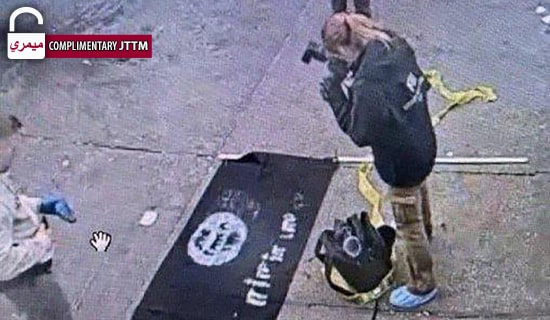On January 6, 2013, Prince Khaled Al-Faisal, considered an influential figure within the ruling Saudi family, wrote a poem criticizing the "Western winds" that have "invaded the Arab world," bringing calls for freedom and the establishment of civil states. In the poem, Al-Faisal, who is known in the kingdom as a liberal prince who opposes radical Islamist ideology,[1] urges the Arab world to disregard such calls and to adhere to Islamic models of rule. At the same time, he appeals to Muslim scholars for a ruling on the matter, asking them to offer "modern alternatives" to the Islamic regimes.[2]
The poem generated a public debate in the Saudi dailies and in social networks. In the wake of the stormy reception of his poem, Al-Faisal claimed in a Saudi TV interview that the poem did not refer to the Arab Spring, but was intended to warn Saudi citizens of the looming threat to its religious character.[3] Al-Faisal published another poem in the Saudi daily Al-Watan, in which he dealt solely with religious matters.[4]

Saudi Prince Khaled Al-Faisal
Al-Faisal's Poem: "The Winds"
"Western breezes blew
"And invaded the Arab world,
"Obliterating everything
"For the sake of democracy.
"Their goal: a civil state,
"Secular, not religious.
"Only the Zionist state
"Must remain Jewish.
"As for an Arab state,
"It is a terrorist state.
"If it does not change by peaceful means,
"Then it shall be changed by the force of arms.
"The Caliphate is anarchy
"According to 'international justice.'
"Anarchy is Arab,
"Whereas the Caliphate belongs to the Hebrews.
"We have become the problem,
"And have been made to forget the Palestinian [cause].
"They caused us to doubt ourselves
"By means of cultural invasion.
"Using the media they named us liars
"And we believed them.
"They accused us of backwardness,
"Reactionism, barbarism,
"And they instigated sectarian [conflicts],
"And racial and tribal ones.
"The encouraged ideological Westernization
And championed leaders [who serve the West].
This caused the Arabs to riot,
Calling out 'Freedom! Freedom!'
"Oh Muslim scholars, issue fatwas
"And give us modern alternatives.
"The Others [i.e., the West] base their legislation
"On secular models.
"And we copied them naively
"Calling this 'enlightenment.'
"Where is [our] reason? Where is [our] wisdom?
"Where is our Islamic zeal?
"Why haven't we established
"Islamic rule?
"[Our] constitution is the Book of the Creator [i.e., the Koran],
"[And Our] way is the Prophet's Sunna.
"We must show the world
"That our mission is eternal.
"Abraham, Moses, Jesus
"And Muhammad, the messengers to mankind,
"Taught us that governing [means]
"Security, justice and humaneness.
"That shura [the Islamic principle of counsel] is the essence of wisdom,
"And that the shari'a is divine,
"That God is one and his religion is one,
"And that faith is monotheism.
"Why, why, why, why
"Does each of us [Muslims] blame his brother of heresy?
"Fear God in your treatment of others,
"Oh instigators of fitna!"
Poem Sparks Debate On Social Networks
Prince Al-Faisal's poem made waves on the social networks, particularly Twitter, where the hashtag "#Khaled Al-Faisal's poem" began to be used. Many reacted to the poem with disdain, such as Saudi cleric Sheikh 'Adel Al-Kalbani, who said, mockingly, that its style recalled the singing of Sha'ban 'Abd Al-Rahim, an Egyptian pop star whose songs incorporate political messages.

Sheikh 'Adel Al-Kalbani tweets: Prince Al-Faisal's poem is suitable for Egyptian pop singer Sha'ban 'Abd Al-Rahim[5]

Another tweet says: "Khaled Al-Faisal disparages the Arab revolutions and the demands for justice and equal rights with a weak and vacuous poem"[6]
Debate In Saudi Press Over Poem's Intent
Columnists: Al-Faisal's Views Are Baseless
Prince Al-Faisal's poem also generated a debate in the Saudi press, particularly in the government daily Al-Sharq. Some columnists criticized the poem, saying that it was in reference to the Arab Spring, a claim that Al-Faisal denied. Others claimed that the suggestion in the poem that the winds of change were meant to secularize the Arab states was baseless.
In an article in Al-Sharq, columnist 'Abdallah Al-Fawzan said that the winds of change that had swept the Arab Spring states had, in fact, given a voice to the religious streams, the clearest example being the rise to power of the Muslim Brotherhood in Egypt and Tunisia: "Prince Khaled's position [as expressed] in this poem is quite astounding – much more [astounding] than the claim that the winds of change are part of a plot that led the Muslim Brotherhood and religious streams [to power] on horseback…
"Prince Khaled… relies upon an imaginary and baseless assumption. He believes that the winds are subversive Western [winds blowing] across the Islamic state in the service of civil and secular streams... and that these winds seek to hand over the rule in the Arab states to [these] civil and secular streams... one of the aims being to destroy the Islamic state...
"Prince Khaled surely knows that these winds did not collapse the Islamic state in Tunisia, Egypt, Libya, or Morocco but, in fact, brought it into being. Likewise, he knows that these winds did not serve the civil forces, but on the contrary, marginalized some of their elements and brought the religious streams [to power instead]. If [Prince Al-Faisal] knows this, why did he overlook these clear facts and say what he said?
"In my opinion, this poem will harm Prince Khaled Al-Faisal. Indeed, why did he write the poem this way, despite his wisdom and unique mentality? Did he do so in order to reach the average citizen, who, concerned with his own affairs, is unaware of what is happening in the Arab world and in the world at large…? Did he fall into the trap of poetry that sometimes enables those [who write it]... to highlight [certain] hues to the listener and the reader? Or did he rely solely on the prevalent notion [regarding] the West's ill intentions toward Islam throughout history, and on the strong religious sentiment on the local street? It is difficult to find a convincing excuse for this great leap by Prince Khaled, for [he] has no solid footing to which he can return..."[7]
Similar sentiments were expressed by Al-Sharq columnist 'Abd Al-'Aziz Al-Dukhail: "... Like 'Abdallah Al-Fawzan, I disagree with Prince Khaled Al-Faisal that the primary motivation behind the Arab Spring was the Western [desire] to destroy the Islamic state and establish a civil secular state [in its place]. I [also] disagree with the prince that the civil or secular state runs counter to the religion [of Islam], as Turkey, [for example,] is a civil secular state, but one based on the principles and lofty values of Islam...
"The Arab Spring demands a civil state with a constitution founded on the principles of the shari'a. The Arab Spring [consists of] mass movements that broke out one after another, due to the oppression, persecution, corruption, injustice, and the lack of freedom and human respect suffered by the [Arab] peoples at the hands of their rulers... True, in their modern sense, freedom and democracy are a Western construct... [however, long before this], freedom, justice, the rule of law, and the protection of public wealth were principles written in the Koran... [Therefore,] the Arab Spring is an Arab construct, and freedom, honor, justice, and democracy were human constructs before [becoming] Western [constructs]..."[8]
Columnists: The Prince's Critics Misunderstood Him
Various columnists claimed that Prince Faisal's critics had misunderstood his poem. In an article in Al-Sharq, editor Qeinan Al-Ghamdi wrote: "...Al-Fawzan understood the poem as saying that the revolutions were caused by the conspiracies of the West… [but in fact he poem refers to] blindly following the West [out of] Arab ignorance, rather than to a conspiracy by the West… The text [deals with the Arabs'] imitation [of the West] based on ignorance..."[9]
Similarly, columnist Idrees Al-Drees said, in an article in the Saudi daily Al-Watan, that Al-Fawzan had misinterpreted the prince's poem.[10] In another article in Al-Watan, Al-Drees cited a claim by some of Al-Faisal's critics that the poem had, in fact, been penned by some anonymous poet, no longer alive, and not by the prince himself. Al-Drees challenged Al-Faisal's critics: "The case of those who question the [prince] is strange. If Prince Al-Faisal had written a lengthy poem, they would have questioned whether he was, in fact, the writer. [Conversely,] if he had written a poem that failed to impress them, they would have attributed it to him. However, they must accept him as a poet, with all his shifts in his positions..."
Idris also claimed that the prince's detractors were criticizing him because he was a member of the royal family: "... Will this doubting [of the prince] continue just because he is a prince? The people must understand that the Aal Sa'ud family is just like all other families... [Its members,] like everyone else, are mortals who eat and walk about the marketplace..."[11]
[1] See MEMRI Inquiry & Analysis Series Report No.212, Saudi Prince Khaled Al-Faisal Against the Islamist Ideology, March 16, 2005.
[2] Sabq.org, January 6, 2013. For a reading of the poem, see YouTube Clip.
[3] Al-Wiam (Saudi Arabia), January 20, 2013.
[4] Al-Watan (Saudi Arabia), January 18, 2013.
[5] Sheikh 'Adel Al-Kalbani Twitter page, February 23, 2013.
[6] Sheikh 'Adel Al-Kalbani Twitter page, February 23, 2013.
[7] Al-Sharq (Saudi Arabia), January 9, 2013.
[8] Al-Sharq (Saudi Arabia), January 14, 2013.
[9] Al-Sharq (Saudi Arabia), January 10, 2013.
[10] Al-Watan (Saudi Arabia), January 14, 2013.
[11] Al-Watan (Saudi Arabia), January 15, 2013.




